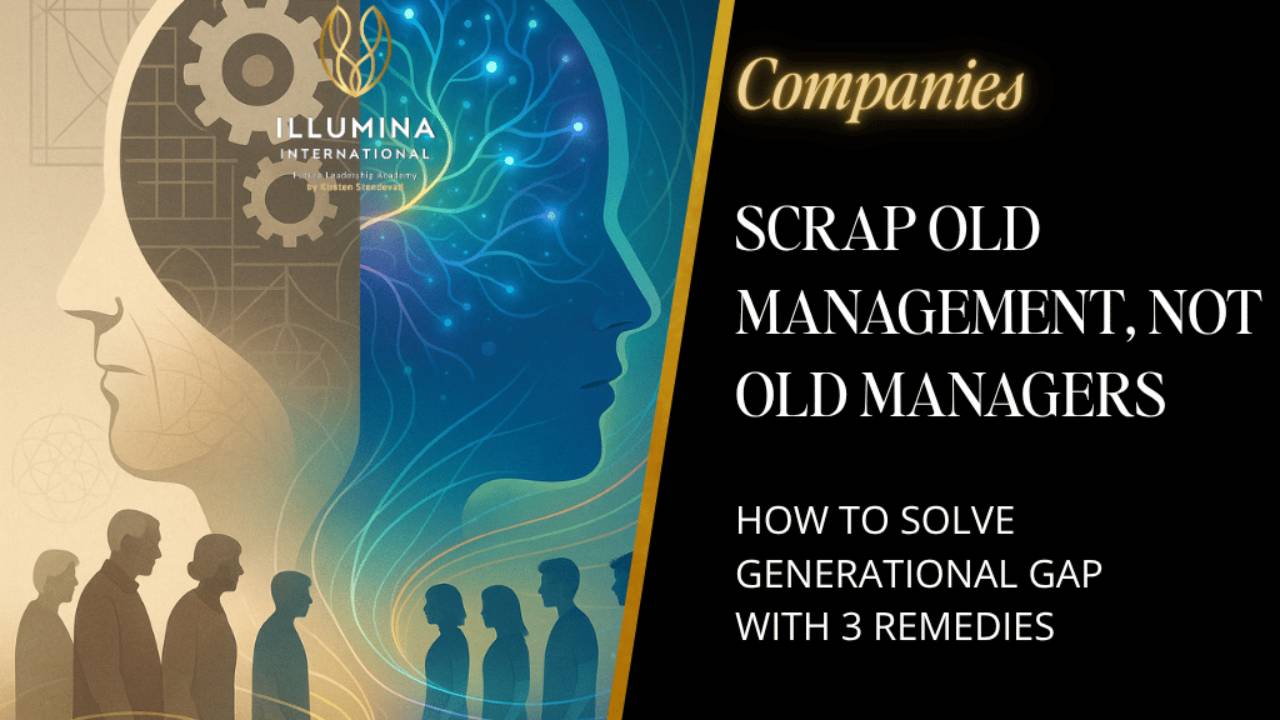Scrap Old Management, Not Old Managers

By Kirsten Stendevad, author and leadership developer
It's not age, but rigidity; not emotions, but triggers; and not the leaders but the management model that blocks good leadership. Until now, it has been virtually impossible to change any of these elements. But new technology combined with old wisdom can come to the rescue.
The Generational Misunderstanding
The problem with young people in the workplace is that they are often (over)sensitive, give up almost before they've started, insist on doing something meaningful whether they have the qualifications or not, and let themselves be distracted by social media instead of doing their work, which incidentally makes them even more anxious and insecure than they were to begin with.
The problem with older people - from Gen X and up - is that they are often old-fashioned, rigid, intolerant, boundary-crossing, create psychological insecurity, have unrealistic expectations about productivity levels, and aren't very creative.
This is roughly how the prejudices sound about the many generations in the workplace who must solve the overwhelming number of problems that businesses and society, indeed all of humanity, face. They're even supposed to collaborate to make it happen.
This obviously creates many problems if you don't master healthy generational dynamics according to Emilia von Hauen's new book "The Generation That Must Save the World - with a Little Help from the Rest of Us."
The Real Question
What is the solution?
Should we just scrap the old and let the young take over - after all, they're the ones who will have to live with the decisions being made? Or should we, in the best Joe Biden style, acknowledge that it's an advantage to have people with a longer frame of reference at the table?
The answer, I believe, is to let go of the old management model that fits neither the young nor the old. And adopt a new one, whereby everyone plays the same game - and by the same rules.
Why Change Alone Isn’t Enough
However, it's far from enough to just read about new management models - they must be implemented to work. But first, only a few have time to implement something new; second, new things keep coming, so the new drowns in the even newer. Third, you can't let yourself be dazzled by new management models every other moment if you're also supposed to do your work. Fourth, most people are too busy to stop and not just be informed and inspired, but transformed.
The Threefold Solution
The solution to this is threefold:
- A new management model built on timeless, universal principles whose time has come.
- Leadership development programs that can take place in minimal time, with the fewest possible costs and maximum effect.
- A solution that makes both older and younger people more neurologically flexible, agile, and creative, as well as less triggered by both work pressure and each other.
I've spent over two decades looking for a solution that encompasses both 1), 2), and 3). And that is both tailored to individual needs and scalable.
Rebooting the Human System
My suggestion is:
We need to start by rebooting and upgrading our brain and nervous system so we can even handle all the new things. This is in no way the case today where most people's brains are in overdrive due to too much information and scrolling (insert scientific studies and statistics). I've introduced brain training in my leadership development programs for the same reason, so we start by actually creating space in an overcrowded system!
Regulating the Nervous System
We also need to take care of the autonomous nervous system, which reacts very primitively even though we are a highly developed society. Our emotions still run away with us and make us stressed and less resilient than we need to be - especially under pressure. We need to hack our nervous system so we can maintain balance under pressure, not least because it only seems to be increasing. For the same reason, I've introduced high-tech methods known from the military to free people from being reactive and enable them to be responsive.
Unlearning and Relearning
I think Alvin Toffler is right that the most important skill in the 21st century is the ability to unlearn and relearn. What needs to be unlearned is the 20th century's (material) mindset and what needs to be relearned is being whole people who think in wholes and are aware of everything's interconnectedness, so you stop destroying something with your left hand that then has to be repaired by the right.
Working with, Not Against, Human Nature
All in all, we need to stop working against our true nature and instead refine it. New technologies are coming to our aid, but we're too slow to implement them because we're too busy being busy. The solution is to use collective intelligence, that is, the ability to connect in ways where 1 + 1 = 11.
The Call to Evolve
I and many others who have worked with the new era's paradigms and developed increasingly effective ways to make the shift to them stand ready to help. Now it's about being brave enough to try something new, because without changing ourselves from within and upgrading both hardware and operating system, we can forget all about keeping pace with exponential changes, the development of artificial intelligence, and the number of crises. Technology regularly doubles its own capacity, so as a leader especially, you need to do the same.
Your Next Step
At Illumina Future Leadership Academy, we help leaders, entrepreneurs, changemakers and their teams thrive today and shape a brighter tomorrow via regenerative resilience, turning crisis into opportunity, and developing AI-complementary human capabilities.
Our next cohorts are forming now.
Start immediately with brain
training that builds up to 25% more focus,
memory, and decision-making skills, plus the neuroplasticity that
maximizes your benefits and transformation when the group
trainings begin.
Schedule a call to explore if this upgrade answers your calling.
Stay connected with updates & news
Join our mailing list to stay in the loop
You can unsubscribe any time with one click
No spam. No sharing with third parties. Only bright ideas & insights. ILLUMINA is latin and means "Please Enlighten Me"


